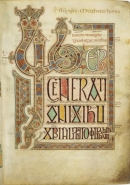| Genesis | Exodus | Leviticus | Numbers | Deuteronomy | Joshua | Judges | Ruth |
| 1 Samuel | 2 Samuel | 1 Kings | 2 Kings | 1 Chronicles | 2 Chronicles | Ezra |
| Nehemiah | Esther | Job | Psalms | Proverbs | Ecclesiastes | Song of Solomon |
| Isaiah | Jeremiah | Lamentations | Ezekiel | Daniel | Hosea | Joel | Amos | Obadiah |
| Jonah | Micah | Nahum | Habakkuk | Zephaniah | Haggai | Zechariah | Malachi |
| Tobit | Judith | Additions to Esther | Wisdom of Solomon | Ecclesiasticus | Baruch |
| Letter of Jeremiah | Prayer of Azariah | Susanna | Bel & the Dragon | 1 Maccabees |
| 2 Maccabees | 1 Esdras | 2 Esdras |
| Matthew | Mark | Luke | John | Acts | Romans | 1 Corinthians | 2 Corinthians |
| Galatians | Ephesians | Philippians | Colossians | 1 Thessalonians | 2 Thessalonians |
| 1 Timothy | 2 Timothy | Titus | Philemon | Hebrews | James | 1 Peter | 2 Peter |
| 1 John | 2 John | 3 John | Jude | Revelation |
 The Book:
The Book:
The Book of Tobit (or "Book of Tobias" in older Catholic Bibles) is a book of scripture that is part of the Catholic and Orthodox biblical canon, pronounced canonical by the Council of Carthage of 397 and confirmed for Roman Catholics by the Council of Trent (1546). Tobit is regarded by Protestants as apocryphal. It has never been considered an integral part of the Tanach, the Hebrew Old Testament, but Aramaic and Hebrew fragments of the book were discovered in Cave IV at Qumran in 1955. These fragments are generally in agreement with the Greek text, which exists in three different editions.
 Narrative:
Narrative:
The book tells the story of a righteous Jew of the Tribe of Naphtali named Tobit living in Nineveh after the deportation of the northern tribes of Israel to Assyria in 721 BC under Shalmaneser V. (The first two and a half chapters are written in the first person.) He was particularly noted for his diligence in attempting to provide proper burials for fallen Jews who had been slain by Sennacherib, for which the king seized all his property and exiled him. After Sennacherib's death, he was allowed to return to Nineveh, but again buried a dead man who had been murdered on the street. That night, he slept in the open and was blinded by bird droppings that fell in his eyes. This put a strain on his marriage, and ultimately, he prayed for death. Meanwhile, in faraway Media, a young woman named Sarah prays for death in despair, because she has lost seven husbands to the demon Ashmodai (Asmodeus) The Devil Asmodeus kills every man she marries on their wedding night, before the marriage can be consummated. God sends the angel Raphael, disguised as a human, to heal Tobit and to free Sarah from the demon.
The main narrative is dedicated to Tobit's son, Tobiah or Tobijah (Greek: Tobias), of the Tribe of Naphtali, who is sent by his blind father to collect a sum of money that the latter had deposited some time previously in the far off land of Media. Raphael represents himself as Tobit's kinsman Azariah, and offers to aid and protect Tobias on his journey. Under the guidance of Raphael, Tobias makes the journey to Media. Along the way, he is attacked by a giant fish, whose heart, liver and gall bladder are removed to make medicines.
Upon arriving in Media, Raphael tells Tobias of the beautiful Sarah, whom Tobias has the right to marry, because she is in his family. He instructs the young man to burn the fish's liver and heart to drive away the demon when he attacks on the wedding night. The two are married, and the fumes of the burning organs drive the demon away to Upper Egypt, while Raphael follows him and binds him. Meanwhile, Sarah's father has been digging a grave to secretly bury Tobias (whom he assumes will be dead). Surprised to find his son-in-law alive and well, he orders a double-length wedding feast (and has the grave secretly filled). Since he cannot leave because of the feast, Tobias sends Raphael to recover his father's money.
After the feast, Tobias and Sarah return to Nineveh. There, Raphael tells the youth to use the fish's gall to cure his father's blindness. Raphael then reveals his true identity and returns to heaven. Tobit sings a hymn of praise, and tells his son to leave Nineveh before God destroys it according to the prophecy of Nahum. After burying his father, Tobias returns to Media with his family, where he later learns that the destruction of Nineveh took place as his father predicted.
Source: Wikipedia, the free encyclopedia © 2001-2006 Wikipedia contributors
(Disclaimer)
This article is licensed under the GNU Free Documentation Licence.
View this article at Wikipedia.org
 Print this page
Print this page